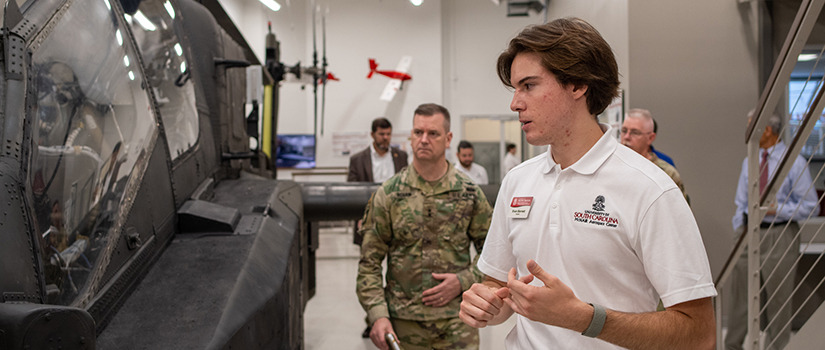Why study aerospace engineering?
Aerospace engineering deals with the design, construction and study of the science behind the behavior of aircraft, rockets and spacecraft.
Aerospace engineers are employed in manufacturing, analysis, design, research, development, and the federal government.
Our students will be prepared to enter this exciting field and contribute to the development
of next generation of aircraft as they are redesigned to be quieter and more fuel-efficient.
Aerospace engineering also encompasses satellites, unmanned aerial systems and the
materials used to build spacecraft.
Our aerospace engineering program is part of the Department of Mechanical Engineering.
Curriculum
Our aerospace engineering program provides a strong foundation in engineering science and engineering design as applied to aerospace materials and structures, including their mechanical and aerodynamic characteristics and behaviors. In addition to taking engineering courses, you will work in project groups, acquiring social skills to work in multi-disciplinary environments and learning how to present your work effectively. Through the design and lab work, you’ll gain hands-on, real life experience that will shape you into responsible and innovative aerospace engineers.
Major subjects included in the aerospace engineering curriculum include:
- Computer Aided Design
- Statics and Solid Mechanics
- Applied Numerical Methods
- Dynamics and Vibrations
- Aerospace Structures
- Aerodynamics
- Energy Power and Propulsion
- Aerospace Systems
- Aerospace Laboratories
- Flight and Orbital Mechanics
- Flight Dynamics and Control
- Thermodynamic Fundamentals
- Engineering Materials
- Manufacturing Processes
- Aerospace Engineering Design
The curriculum also includes the Carolina Core, foundational math and science courses, and technical and engineering electives. Independent study and special topics courses also provide unique learning opportunities.
Visit Undergraduate Curricula and Courses for additional details.
Electives and Specializations
The aerospace engineering undergraduate program allows you to specialize your degree through the intentional selection of the elective classes that are part of the curriculum. These classes can be tailored towards adding a technical minor to your program of study, or to developing advanced knowledge in an area of aerospace engineering such as design and manufacturing, advanced materials, thermo-fluids and propulsion, robotics and control, or electrical engineering for power electronics systems, digital control systems, and wireless communications.
Capstone Design
During the capstone design experience, aerospace engineering students master techniques for managing, planning and executing engineering projects. The aerospace engineering capstone design course pairs student teams with real-world projects to develop a solution to an aerospace engineering problem. Students apply computer-based analysis and synthesis techniques and statistical methods to support manufacturing, safety and reliability-based design. The capstone design experience integrates design with engineering ethics, written and oral communications, and an understanding of the social impact of engineering decisions and projects.
Extracurriculars
Aerospace engineering students participate in a variety of clubs including our student chapters of:
- American Institute of Aeronautics and Astronautics (AIAA)
- Society for the Advancement of Material and Process Engineering (SAMPE)
- Society of Manufacturing Engineers (SME)
Undergraduate research opportunities in the areas of aerospace system design and structures, computer aided design, propulsion and combustion, joining technologies, composites materials and manufacturing, and unmanned aerial systems are available. Undergraduate researchers get involved on a volunteer, course credit or paid position basis.
With other undergraduates in our college, aerospace engineering students take full advantage of living-learning communities, mentorship opportunities, study abroad, intramurals, internships, just hanging out with friends, and more.
Visit Student Experience to learn more.
